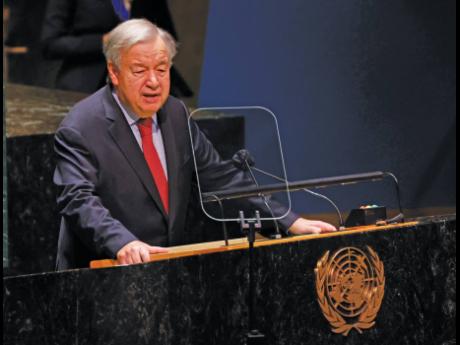Elizabeth Morgan | UNGA: Solving problems to which we all contribute
“I am here to sound the alarm. The world must wake up. We are on the edge of the abyss – and moving in the wrong direction.”
Since the creation of the United Nations (UN) 76 years ago, an important annual meeting on the schedule of member states is the General Assembly (UNGA). The UNGA is the main policymaking body of this global multilateral organisation now with a membership of 193 independent countries. It also has observers. The 14 independent countries of the Caribbean Community (CARICOM) are UN members. CARICOM, as a regional institution, also has observer status.
The Assembly meets from September to December and covers all issues addressed in the UN Charter – disarmament and international security, economic and financial, special political (peacekeeping, information) and decolonisation, administrative and budgetary, and legal. The high-level general debate, in which heads of state and government participate, is usually held over two weeks in September.
This year’s debate was held September 21-27. Due to the COVID-19 pandemic the 75th session was held virtually, and, this year, with vaccines, a hybrid was possible, with over 100 Heads of State and Government participating in-person and others pre-recording their statements. In-person participation is favoured as the annual visit to New York, the UN headquarters, allows heads and ministers to hold bilateral and multilateral meetings among states and to meet with officials of UN bodies. The theme of this year’s 76th UNGA is ‘Building resilience through hope’.
LACKING THE WILL
The CARICOM Foreign Ministers Council (COFCOR) meets to prepare for the UNGA. Usually, CARICOM as a group is able to have several meetings with partners. This would have been particularly important this year given the need to address a wide range of issues, including COVID vaccines, and to have consultations in preparation for upcoming important UN meetings. Most CARICOM heads were at the UNGA. Antigua and Barbuda, Dominica, and Jamaica made pre-recorded statements.
The policy statements, as expected, focused on COVD-19, vaccine inequity, natural disasters, debt, the sustainable development goals (SDGs), economic recovery (building back better), and climate change, among others.
Prime Minister Mia Mottley of Barbados, in a characteristically strong statement, pointed to the lack of progress on the major issues, asking how many times they must be raised before action is taken.
But for me, there is that other finger pointing at CARICOM because, in this region, the will to address our problems, to the extent possible, has also been lacking. CARICOM has not developed a reputation for action. We, in CARICOM, also contribute to the problems and to the failure to act. We need to see real solidarity in our common interest at the national, regional and global levels. As said before, CARICOM leaders could have done more in the region’s interest over the last 20 years.
ADDRESS BY THE UN SECRETARY GENERAL
The statement at the General Debate, which impressed me most, was that delivered at the opening by the re-elected UN Secretary General António Guterres.
I recommend that you read it. Sounding the alarm, the secretary general pointed to the problems faced by the globe, to which all have contributed, and told the Assembly – we face a moment of truth; now is the time to deliver; now is the time to restore trust; now is the time to inspire hope – the problems we have created are problems we can solve.
SG Guterres highlighted six divides that need to be bridged to save humanity and the planet. These he listed as:
• Peace – peace and stability remain a distant dream – a new comprehensive agenda for peace is needed.
• Climate Change – do not wait for others to make the first move – do your part.
• Rich and Poor – bridging this gap commences by ending the pandemic for everyone, ensuring that vaccines are available to all – a lopsided recovery deepens inequalities – advanced economies are investing 28 per cent of GDP in recovery, middle-income countries – 6.5 per cent, and the least developed – 1.8 per cent.
• Gender – addressing the power imbalance between men and women, which would be a game changer for humanity.
• Digital – half of humanity has no access to the Internet – embrace the promise of digital technology, while protecting people from its perils – the use and abuse of data, its influence, its use in commerce – put in place the legal frameworks to ensure a safe, equitable and open digital future for all; and
• Generations – including young people in the discussions and in decision-making.
The secretary general called on UN member states to advance their common interest, which actually addresses national interest.
So, while calling on others to play their part, CARICOM member states must also demonstrate that they are committed to acting to address problems at the national and regional levels.
Elizabeth Morgan is a specialist in international trade policy and international politics. Email feedback to columns@gleanerjm.com

